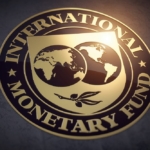
The International Monetary Fund (IMF) has maintained that it fully endorses the Bank of Ghana’s strict enforcement of foreign exchange regulations and guidelines.
The IMF maintained that these actions and measures are needed to “broaden financial integrity compliance with anti-money laundering rules and broader transparency in the FX market”.
The Director of Communications at the IMF, Julie Kozack, was responding to a question posed by some journalists during a press conference in Washington DC, USA, on 11 September 2025.
Mrs Kozack argued that these directives “are intended to reinforce the role of the cedi as the sole legal tender in the country”.
“They’re meant to tighten controls on foreign currency transactions and to promote formal channels for the provision of remittances and trade,” the Director of Communications at the IMF stated.
Bank of Ghana Directives
The Bank of Ghana over the past months has moved to strictly enforce some of its FX guidelines. One can talk about its guidelines on remittances, over-the-counter withdrawals by companies that don’t operate deposit accounts, as well as pricing in foreign currency in Ghana.
On August 27, 2025, the BoG announced amendments to its guidelines on the importation and exportation of foreign currency.
The Bank emphasised that the directive aligns with global anti-money laundering standards.
It reminded travellers that carrying more than $10,000 (or its equivalent in other foreign currencies and monetary instruments) without declaration is prohibited.
The Bank also reiterated that unlicensed forex dealings, black market transactions, pricing or advertising in foreign currencies, issuing receipts, or making and receiving payments in dollars within Ghana are strictly banned under the Foreign Exchange Act, 2006 (Act 723).
Governor of the Bank of Ghana Dr Johnson Asiama told JOYBUSINESS in an interview that directives are not new but part of the bank’s renewed effort to strictly enforce existing foreign exchange and anti-money laundering regulations.
“These are not new issues, but the difference now is that we are closing the gaps, tightening oversight, and enforcing discipline,” Dr Asiama added.